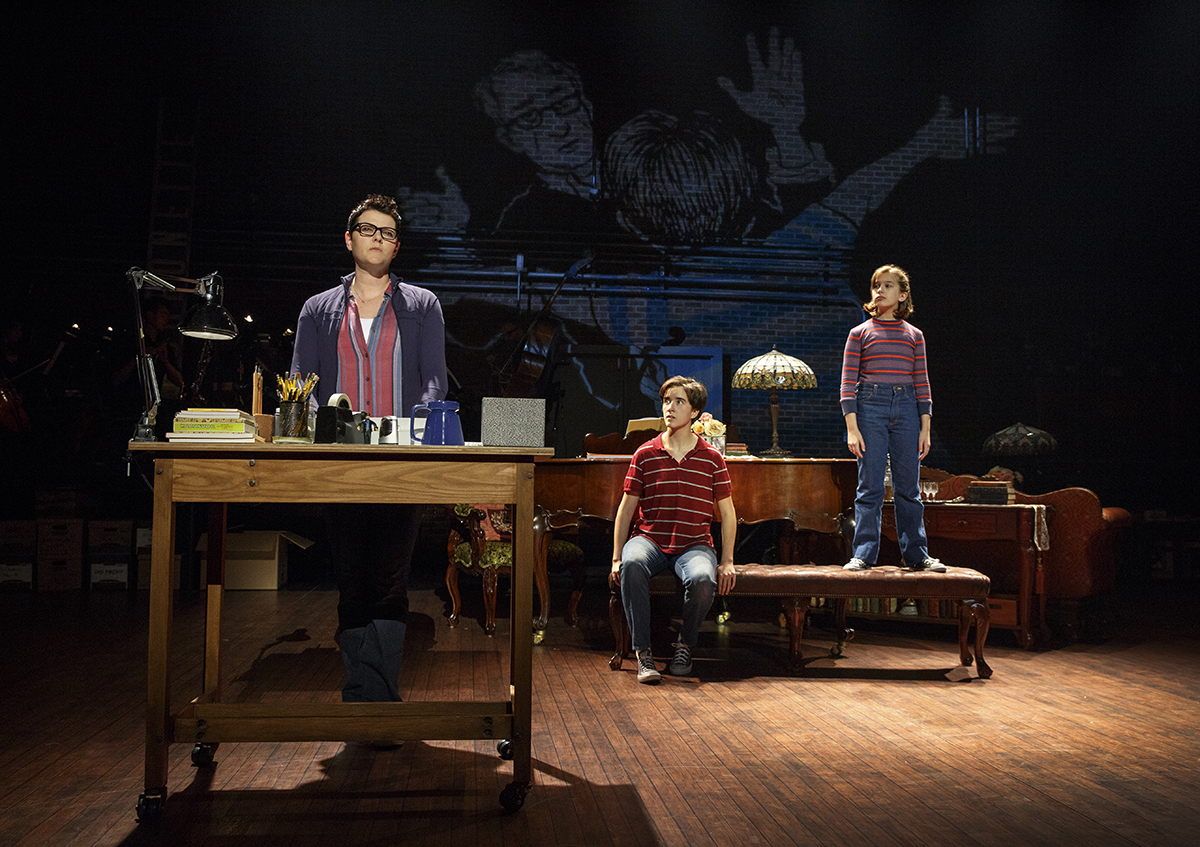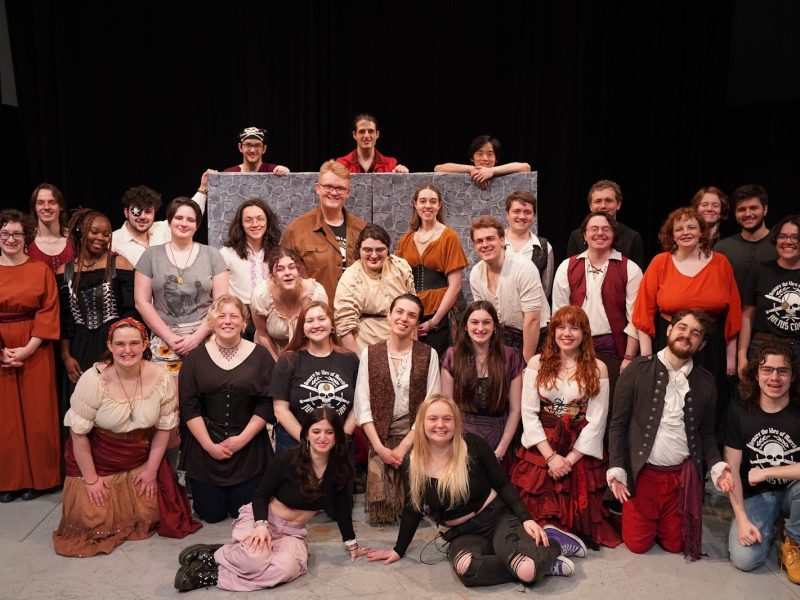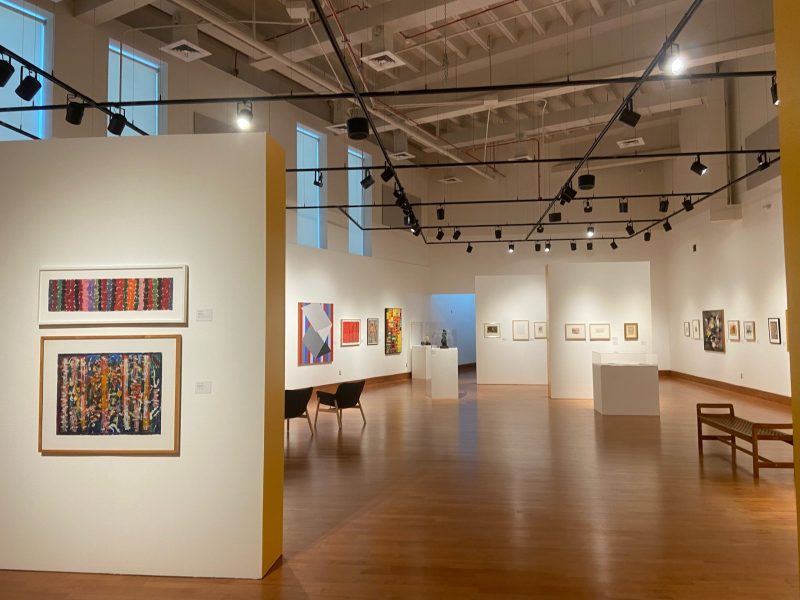It’s early morning in a college dorm and everything sits strangely quiet as young residents recharge from the previous night’s adventures. In her room, Alison is too excited to join the chorus of snores. She sits up and takes a look around. Underneath the bed is a pile of novels sent by Dad, along with his vague response to the letter she sent a few weeks ago, the one saying she thinks she might be gay. Above the bed, tangled up in the sheets, is a sleeping confirmation of this suspicion.
Ah, Joan. She’s confident and funny and smart, a perfect guide to lead Alison into this new and daunting world. Alison gets up from the bed, and with the reckless enthusiasm of any freshman in love, she begins to sing.
“I’m changing my major to Joan!” she exclaims.
This line, the titular lyric in Fun Home‘s “Changing My Major,” got quite a laugh from the opening night crowd at the National Theatre Wednesday. The Broadway hit had just arrived in Washington on a national tour, its success the result of a formula made up in part by laugh breaks like that one. The musical, based on Alison Bechdel’s autobiographical graphic novel, is undoubtedly funny.
But as “Changing My Major” continues, Alison’s ode veers toward other places. Because freshman year hookups are complicated, right? Especially when sexual exploration is thrown in, those nights provide much more than just a few chuckles. For one, there’s the joy of finding someone who wants you, wants to wake up in your bed. There’s also the apprehension that maybe they won’t want to do so again or that you’ve made some kind of mistake. And the excitement that, in this new, seemingly vast sea of people, you’ve found someone so quickly. Maybe they’ll be a part of the new you, a college you.
All of this exists in Alison’s voice as she stares down at Joan, careful not to wake her. In a whisper, she asks, “Will you stay here with me for the rest of the semester?”
“Changing My Major” proves to be a slow reveal of the other half of Fun Home‘s formula. What’s made the musical a Tony-winning hit is that for every ounce of humor, there’s a dose of heart. It’s a charming, effective combination, one that cemented the show as a success on Broadway and does so again at the National.
Alison in the bedroom with Joan is one of three Alisons in the play. We see her when she’s young, growing up in a Victorian Pennsylvania home that her dad works hard to restore. His handiwork comes in between his teaching gig (hence the sent books) and his role at the family business, a funeral home that the kids call the “fun home.” Played by Robert Petkoff on this tour, it becomes clear right away that, outside of Alison, our narrator and the heart of everything, Bruce is the most complex character in the show. This fact makes more sense when we learn early on that he lived his life as a closeted gay man and that he decided to cut that life short with suicide.
Our third Alison, adult Alison, is still struggling with that moment. She has a life of her own now as a cartoonist — a proud lesbian cartoonist. Our narration comes from her working through her graphic novel, trying to capture the truth of her childhood and the legacy of her father. She grapples with every blank frame, trying to transport herself back to some memories and struggling to avoid others.
We see that, in the Bechdel house, restoration techniques were a way of life. Everything had be in order, polished and looking as good as possible. Bruce’s homosexuality is wiped down too — his wife knows, but nothing is said. She’s always known that he carried out secret trysts with men, some of them pretty young. Alison finds out this truth just as she’s arriving at some conclusions about her own sexuality. It makes her question the reality of her childhood and realize that, as children, we live in the reality our parents create for us. As adult Alison sings at one point late in the play, “What do you know that’s not your dad’s mythology?”
Fun Home deftly explores this idea of influence — both short-term, trivial deceptions and big-picture, character-shaping inspirations. In this play, every Alison has her father looming over her in some kind of way. Young Alison (the very talented Alessandra Baldacchino) deals with him directly. He teaches her the best way to draw and lifts her up with his feet when they play airplane. College Alison (Abby Corrigan in the night’s best performance) has his advice and the occasional phone call to guide her through the series of small challenges that freshman year can present. And adult Alison (Kate Shindle), living on after his death, has only memories that stick around all the time — memories like that drive they took together that one time she came home from school, when she knew he was gay and he knew she was gay, too.
They travel mostly in silence, Bruce moving closer to the end and now constantly distracted by the noise in his own head. He’s beside his daughter — she is dealing with her own noise, her own distraction and could use a good talk — but he’s not really with her. Most of the talking comes from an adult Alison who exists years in the future. She sings to her younger self as the pair in the past drive through small town streets.
“Say something, talk to him,” she pleas, trying to alter reality. “Anything. At the light.”
But what is it that she wants to say? Fun Home does such an exceptional job of creating complex, human dynamics that it’s hard to really know. What would any of our adult selves say to our parents if we could go back? Especially in the case of Alison and her dad, there are surely some big questions they could tackle — real issues about sexuality and family and responsibility and life that they could sort through. Or maybe it would be simpler than that. Something like thanks for the books, or I love you.



